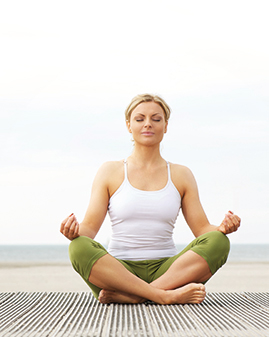
Rude Fit
And Relax...
Relaxation is not just about that five minute warm down you do after a workout, it plays a crucial role in the body’s overall wellbeing. Rude Health consults the experts...
The importance of relaxation
Carl Cautley of Fitness Together in Ranelagh, Dublin 6: “it’s important to distinguish between active relaxation and general downtime such as pub, cinema, eating out etc. Active relaxation can come in many forms and improve both mental and physical health. Sometimes you can combine both or do them separately. For example, go for a walk and actively listen to all the different sounds. This both stimulates you physically but also calms your mind.”
Tom Dalton of Tom Dalton Fitness in Blackrock, Dublin: “Relaxation is important for us all because of the high levels of stress in our everyday life. Stress can affect the body in many different ways, causing digestive disorders, raising cholesterol levels and lowering our immune system, which leaves us open to viruses and sickness. So we need to prevent this as much as possible with daily exercise, a balanced diet and the correct amount of sleep.”
Pat Divilly of Pat Divilly Fitness: “People often train to ‘de stress’ forgetting that training is a stress in itself. Of course there are massive benefits to working out, but it’s also important to help bring down cortisol, the stress hormone, by improving sleep, recovery and overall feelings of wellbeing.”
The best classes
“Yoga is a great form of both exercise and relaxation,” says Carl Cautley. “However, everyone should do a little research to see which type is best for them. If you wish to concentrate on just the mind, I would suggest meditation. My friends in the Brahma Kumaris are always running free courses and talks to help people get more balance in their lives.”
“One thing that I have gained from my yoga classes is good breathing techniques,” says Tom Dalton. “If I control my breathing using longer breaths I can relax my body. If we supply the body with generous breathing during the day this will alleviate tension and stress on the body.”
“I believe it’s important to find the class that you enjoy,” says Pat Divilly. “T’ai chi, yoga and guided meditation are all great classes for slowing down and relaxing, but try a few different things and find the one that brings you the most peace.”
Exercises to do at home
Carl Cautley: “Just lie on your back, hands beside your body, hands and feet turning outwards. Now bring your mind to each part of your body slowly, stay there for a couple of seconds, relax that part and move to the next. Finally finish on your breath, just observe, do nothing and relax. It’s a great de-stresser, but a word of warning, if you fall asleep you have gone too far.”
Pat Divilly: “Box breathing is great. With your hand on your belly, breath in through your nose for four seconds and hold for four. Your belly should rise. Most of us are used to breathing shallowly into our chests from stress. Now exhale through your mouth for four and hold for a further four. Repeat this for six to 10 breaths to relax the body. I often find that clients who can’t touch their toes perform a few deep belly breaths and are then able to touch the floor.”
Exercise of the issue: by Tom Dalton
Back-side stretch:
1. Interlace your fingers and lift your arms over your head, keeping the elbows straight. Press arms as far back as you can. To stretch your sides, slowly lean to the left and then to the right.
2. Bring your arms in front of your body and stretch away from your body.
3. Put your hands together behind your back to stretch the shoulder blades and chest.
Simple tips:
- Food – eat high quality, grass-fed fresh organic meals and include more colourful vegetables in your diet. Aim to remove foods that lead to inflammation, such as processed foods.
- Breathe – de-stress and clear your mind through deep breathing techniques and meditation.
- Sleep – get your sleep in check. Make sure you are getting enough sleep each night in a dark, noise-free environment. Eight hours is the recommended amount of sleep per night.
Click here to read other Rude Fit articles.
Click here to return to the Rude Health Magazine homepage.